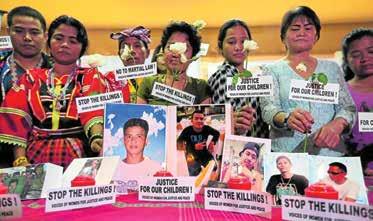
3 minute read
Marcos, Anwar talk peace...
for a binding COC in the past few years to manage tensions amid competing claims in the resource-rich South China Sea.
Economic ties
Advertisement
Meanwhile, the two countries also agreed to boost trade and investment exchanges.
The two leaders agreed to “reinvigorate trade and investment exchanges, with a special focus on the halal industry, agriculture and food security and the digital economy.”
”Prime Minister Dato’ Seri Anwar Ibrahim and I had a cordial and productive discussion on Philippines-Malaysia bilateral cooperation, reaffirming our two beliefs,” Marcos said.
“If we truly stand for democracy, let us face the future by making our sense of community and patriotism the defining cornerstones of our society and the overarching goals of all our efforts in nationbuilding. I wish everyone a meaningful commemoration,” he added.
The Social Weather Stations on Thursday, February 23 reported that 62% of Filipino adults feel that the spirit of EDSA People Power is still alive, even after Marcos’ 2022 win and the widespead misinformation that supported his candidacy. n countries’ desire to revitalize relations as we traverse past the pandemic then through the years towards a new normal,”
Marcos said.
Marcos said the two countries’ shared historic roots are deep, and the Philippines and Malaysia’s cultures enjoy natural affinity.
“As such, we spoke of further deepening our people-to-people ties through continued cultural exchanges and tourism,” Marcos said, recognizing the role of the Filipino diaspora in Malaysia and their contribution to both economies.
The two leaders also committed to continue supporting and enhancing cooperation with the Brunei-Indonesia-MalaysiaPhilippines East ASEAN Growth Area (BIMP-EAGA), including hosting the Brunei-IndonesiaMalaysia-Philippines Facilitation Center.
The Philippines and Malaysia are among the founding members of the ASEAN and the BIMPEAGA.
“We have thus resolved to support development and peacebuilding initiatives within this group, including the importance of achieving a resolution to the situation in Myanmar,” the president said. (Pia Lee-Brago, Janvic Mateo, Cecille Suerte Felipe)
Drug war victims’ kin tell ICC...

have filed communiques before the court since 2016 accusing then President Rodrigo Duterte and other officials of crimes against humanity by authorizing thousands of extrajudicial killings (EJKs) in the bloody campaign against illegal drugs.
‘Trauma, loss of income’
They argued that the Philippine appeal to suspend the ICC investigation would have an “immediate and direct effect on the personal interests of the applicants as they have not been able to obtain justice and remedies for the crimes committed against their family members.”
Some of the applicants, they said, “experienced torture at the hands of the police in relation to the drug war.”
“As a result of the killings of their family members or the torture they were subjected to, the applicants have suffered physical, psychological and socio- economic harm, including physical pain, injuries, anxiety, loss of sleep, trauma, feeling of fear, depression, loss of income, and economic hardship,” they said.
Obscured death toll Government data put the death toll of the drug war during Duterte’s term from July 2016 to May 2022 at 6,252 individuals, but human rights groups contend that the actual number could be three times that, as a consequence of sloppy investigation, and in a number of documented cases, falsified death certificates.
The Philippine government is expected to file its appeal brief before the March deadline, after the ICC Pre-Trial Chamber I, in a Jan. 26 decision, authorized ICC prosecutor Karim Khan to proceed with the preliminary investigation.
In a Feb. 3 petition, the government, through Solicitor
General Menardo Guevarra, who served as Duterte’s justice secretary, sought the reversal of the ICC chamber’s decision.
Under ICC processes, the government is to submit its arguments in a more detailed appeal brief, with the prosecutor given the chance to respond afterward.
The Marcos administration has supported its predecessor in the ICC case, arguing that the court has no jurisdiction over the Philippines after the country’s withdrawal from the Rome Statute took effect in 2019, and that the government is already investigating the same drug war-related crimes under scrutiny.
In 2021, the Supreme Court ruled that withdrawing from the Rome Statute “does not discharge a state party from the obligations it has incurred as a member.”
Back in Geneva
On Wednesday, March 1 Justice Secretary Jesus Crispin Remulla was to again seek to convince the international community that the Philippines is pursuing human rights reforms, as he was to address the 52nd Regular Session of the United Nations (UN) Human
Rights Council (HRC) in Geneva, Switzerland.
Remulla was expected to speak on the “progress in the government’s justice sector programs under the Marcos administration’s larger human rights and development agenda,” the Department of Justice (DOJ) said in a statement. He was also to discuss the importance of upholding sovereignty and harnessing international solidarity in the promotion and protection of human rights, the DOJ said.
Remulla was scheduled to meet with HRC President Vaclav Balek, UN High Commissioner for Human Rights Volker Turk, Australian Assistant Foreign Minister Tim Watts, and UN Framework Convention on Climate Change Director General Majid Al Suwaldi.
On Tuesday, February 28 he was expected to join a panel discussion to share what the government had done to strengthen the criminal justice system, particularly in decongesting jails and prisons, reducing case backlogs, and improving the poor’s access to the system. (With a report from Tina G. Santos)







